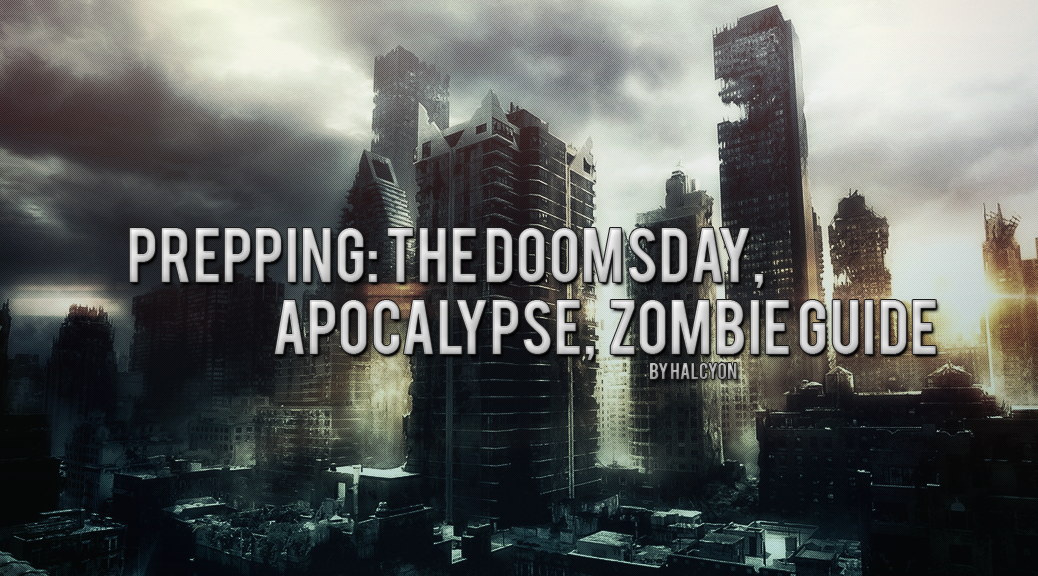By Halcyon
The current state of affairs both at home and abroad – no matter where home is – has given many cause for concern about the future. Others have long believed the end is nigh. Whether you fear nuclear annihilation, a mysterious uprising, or are just curious about the phenomenon known as “prepping”, Halcyon is here to get you started! Even if you decide the full prepper lifestyle isn’t for you, it’s always a good idea to have plans in place for a variety of emergencies – don’t wait until it’s too late!
Prepping: The Doomsday, Apocalypse, Zombie Guide:
Don’t Get Caught Unprepared!
Even if the world didn’t already seem like it’s on the verge of Armageddon some days, prepping – whether for catastrophes or as a way of being ready for any unforeseen event – is still a very good skill to learn, and one that you can modify for you and your family.
While prepping is by no means mainstream and generally still thought of as unconventional, there’s a lot more information out there than when I started – so much so, in fact, that it can be overwhelming. While I always advocate doing your own research, I’m hoping that my years of it can be of use. At the very least, I can give you a place to start.
De-clutter and Organise
This is vital before you start. I can’t stress it enough. As many tips and tricks as I might give, I don’t think any are quite as important as this. Once you take inventory, you will be surprised at how much you already have, and it will save you money.
Hand in hand with de-cluttering and organisation is taking stock of how much space you can devote to your prepping, as well as figuring out your own personal reasons for wanting to prep. If you are living in a smaller space – like an apartment or even a tiny home – you can still prep. You may simply have to make a place in a closet or spare room, or devote part of your garage to it.
Every scenario for prepping brings with it different needs. Someone who fears an economic downfall is not going to prep the same way as someone who fears the resurgence of a previously contained disease. There might be general similarities, but priorities are likely to be different.
Here’s a checklist to help you get started:
• Make an inventory of what you already have. Everything from pantry to cleaning supplies – and don’t forget the outside freezer if you have one!
• Toss out expired items, from food to cleaning supplies and medication. Think of it as streamlining.
• Organise what you have. Label bins and boxes and prepare the space you are going to use.
• Create a Master List. Use a computer program, if it helps, and update it regularly.
• Whatever space you use, utilise it effectively. Trust me when I say that once you start, you will be surprised at just how much you will pack away, and without a good method of organisation you will run out of room fast.
Efficiency is the cardinal rule of prepping. There are great sites that can walk you through making the best use of whatever size space you have. Even Pinterest has great ideas on utilising space.
Each segment of this series will tackle a different step toward prepping. If you decide to go on this adventure, it’s important to know that it does not come without bias or criticism. While prepping has come a long way, many still fail to see the value prepping might have. You’re going to have thick skin, because chances are that everyone – from friends to family to strangers – will have an opinion and many of those opinions will not be nice. You’ll need to take judgmental comments in stride. Prepping is about taking responsibility for your survival and the survival of those dependent on you. The sooner you accept that, the safer you will be in the future. It’s human nature to get comfortable in your home and life and think that nothing bad is going to happen until it does. Many people leave it to first responders and the government to help, but as was seen with Hurricane Katrina, that is not always a reliable plan. I think prepping helps us take the first step toward being responsible for ourselves and our family.

